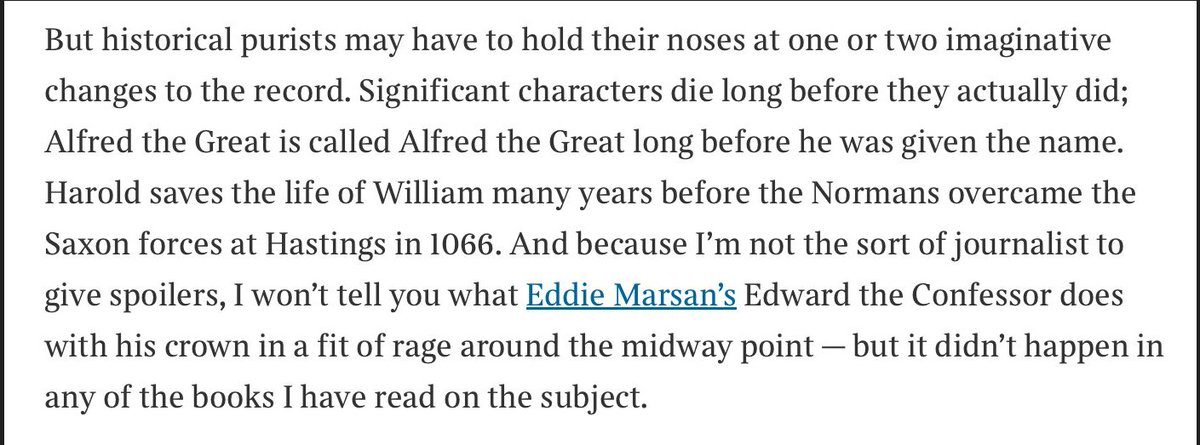The annual "Christmas **IS** pagan!!" festival has kicked off a little later this year, but it seems it's now arrived with full force. This is where people who haven't studied this subject at all, but can Google some crappy online pop history articles, get very cross with ...
... those of us who have the temerity to rely on evidence, reason and current scholarship. So @MrEricABlair recently declared that the idea that most elements of the Christian festival of Christmas are, not too surprisingly, actually Christian in origin to ...
... be "absolute bollocks".
https://twitter.com/MrEricABlair/status/1598959702221561856
And to support the old "pagan origin of Christmas" idea, he found one of those crappy online pop history articles I just mentioned. See below:
academuseducation.co.uk/amp/how-saturn…
academuseducation.co.uk/amp/how-saturn…
Unfortunately, these articles just repeat some nineteenth century assumptions that more modern scholars have come to seriously question. The idea of syncretism - the amalgamation of pagan practices and festivals into early Christianity - was the default assumption of previous ...
... generations of scholars. This assumption, in turn has Christian roots: Puritan reformers assumed any Christian practice which was not strictly "Biblical" was a wicked "Popish" accretion and usually had pagan roots. However modern scholars are much more cautious about ...
... Christian feasts, folk beliefs and festival traditions having pre-Christian origins. Some may have, but the evidence doesn't actually support many of the older claims in this regard.
So, yes, Saturnalia was celebrated by the Romans in December. But no, it is not the origin...
So, yes, Saturnalia was celebrated by the Romans in December. But no, it is not the origin...
... of the date of Christmas. Saturnalia fell on Dec 17, not Dec 25. Even in its later, more extended form, it still fell short of Dec 25. The crappy article above claims "the climax of the festival shifted from December 25th to the winter solstice and back again". Apart from...
... being confused (Dec 25 *was* the solstice), this claim is also nonsense - there is no evidence of Saturnalia ever extending to Dec 25. There are also many claims online about how the key elements of Christmas celebrations - decorating with holly, ivy and fir, exchanging ...
... gifts, wreaths and candles and feasting and drinking - all have their origins with Saturnalia. Unfortunately, there are no references in any Roman sources to wreaths, holly, ivy or fir. Gifts were exchanged at Saturnalia, but there is no actual connection between that ..
... tradition and Christmas gifts. The latter have a traceable origin in the feast of St Nicholas on Dec 6 and only became part of Christmas celebrations in recent centuries. Candles are pretty obviously going to feature in any pre-modern midwinter festival. And humans ...
... usually do a bit of feasting and drinking at any festival time.
So is the article right about the origin of the Dec 25 date in "the Roman festival of dies natalis solis invicti (‘day of the birth of the unconquered sun’)"? The problem here is that we have only *one* ...
So is the article right about the origin of the Dec 25 date in "the Roman festival of dies natalis solis invicti (‘day of the birth of the unconquered sun’)"? The problem here is that we have only *one* ...
... reference to this festival, in the Chronograph of 354. There are no references to it earlier than this and evidence indicates that the main feasts of the Sol cult fell in August and October, not on Dec 25. Steven Hijmans, the scholar who has literally written the book on ...
... the Roman Solar cults, shows that this "dies natalis solis invicti" on Dec 25 seems to have been a fourth century innovation, not some ancient Roman tradition. And given we have a reference to Christ's birth being marked on Dec 25 in Hippolytus of Rome, *Commentary on ...
... Daniel* 4.23.3 which dates to over a century *before* our sole mention of the "dies natalis solis invicti", the argument that the date of Christmas derives from this (new) pagan festival doesn't actually work. Hijmans actually suggests that the Sol cult chose to celebrate ...
... on this date because of the Christian feast, not the other way around. See S. Hijmans, "Sol Invictus, the Winter Solstice, and the Origins of Christmas", *Mouseion*, Series III, Vol. 3, 2003, pp. 377-98 and his monograph *Sol: Image and Meaning of the Sun in Roman Art and ...
... Religion Vol. 1* (Brill, 2022). For an accessible summary of the more recent scholarship on this see @andrewmarkhenry's excellent "Religion for Breakfast" video:
So the crappy online pop history articles that always get rolled out at this time of year reflect some highly outdated nineteenth century ideas that modern scholars have revised and corrected. On the (very limited) actual evidence re Saturnalia, @SpenceMcDaniel has a carefully...
... sourced article that shows the usual claims made about its influence on Christmas traditions are largely baseless:
talesoftimesforgotten.com/2020/12/18/how…
talesoftimesforgotten.com/2020/12/18/how…
And another one debunking the "pagan Christmas" claims more generally:
talesoftimesforgotten.com/2019/12/08/jus…
talesoftimesforgotten.com/2019/12/08/jus…
Classicist @PeterGainsford tackles the similar claims about pagan Yule and its influences on Christmas, which are far more uncertain and likely more minimal than is usually claimed:
kiwihellenist.blogspot.com/2018/12/concer…
kiwihellenist.blogspot.com/2018/12/concer…
And his "Twelve Myths of Christmas" thread is also worth a read:
https://twitter.com/PeterGainsford/status/1473247706495655938
Finally, there's my article from a couple of years ago debunking some more of the more bonkers "pagan Christmas" claims (like Santa being derived from Odin):
historyforatheists.com/2020/12/pagan-…
historyforatheists.com/2020/12/pagan-…
What is remarkable about all this is the fierce resistance we get when we try to tell people that scholars largely reject most of the "pagan Christmas" claims. It seems some people really *like* this outdated idea and any suggestion it's wrong must be ... well, "absolute ...
... bollocks". And it seems while ever those endless crappy online pop history articles hang around, people are going to cling to this bad idea. So the annual "Christmas ***IS** Pagan!!" festival will roll around every year, to the merriment of all. 😉😎
Happy Christmas everyone.
Happy Christmas everyone.
Scholarly Papers referred to:
Steven Hijmans, "Sol Invictus, the Winter Solstice, and the Origins of Christmas", *Mouseion*, Series III, Vol. 3, 2003, pp. 377-98 and his monograph *Sol: Image and Meaning of the Sun in Roman Art and Religion Vol. 1* (Brill, 2022).
Thomas C. ...
Steven Hijmans, "Sol Invictus, the Winter Solstice, and the Origins of Christmas", *Mouseion*, Series III, Vol. 3, 2003, pp. 377-98 and his monograph *Sol: Image and Meaning of the Sun in Roman Art and Religion Vol. 1* (Brill, 2022).
Thomas C. ...
... Schmidt, “Calculating December 25 as the Birth of Jesus in Hippolytus' ‘Canon’ and ‘Chronicon’” *Vigiliae Christianae* Vol. 69, No. 5 (2015), pp. 542-563.
Philipp Nothaft, "Early Christian Chronology and the Origins of the Christmas Date: In Defense of the 'Calculation ...
Philipp Nothaft, "Early Christian Chronology and the Origins of the Christmas Date: In Defense of the 'Calculation ...
... Theory'" *Questions Liturgiques*, 94 (2013), pp. 247-65.
Thanks to Dr. Andrew M. McHenry (@andrewmarkhenry) and Dr. Philipp Nothaft (@OfTrala) for their tireless work trying to debunk these myths. An endless annual task but worth doing.
Thanks to Dr. Andrew M. McHenry (@andrewmarkhenry) and Dr. Philipp Nothaft (@OfTrala) for their tireless work trying to debunk these myths. An endless annual task but worth doing.
• • •
Missing some Tweet in this thread? You can try to
force a refresh













